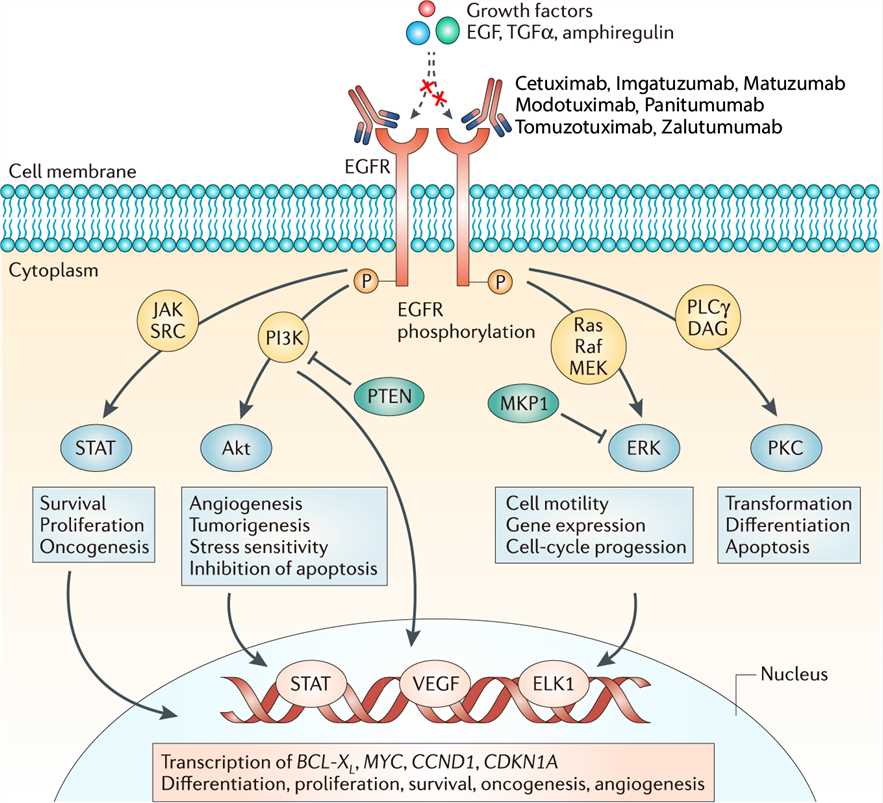Modotuximab Overview
Introduction of Modotuximab
Modotuximab, also known as zatuximab, is a recombinant human-mouse chimeric monoclonal antibody (mAb) for the treatment of metastatic colorectal cancer (mCRC) and glioblastoma (GBM). It acts as an immunomodulator and binds to epidermal growth factor receptor (EGFR; ErbB-1; HER1 in humans). Modotuximab was 1:1 mixed with futuximab, another human-mouse chimeric mAb, to generate the Sym004. Futuximab and modotuximab directed against non-overlapping EGFR epitopes. Preclinical studies with Sym004 have demonstrated activity against a variety of EGFR-expressing solid tumors. Additionally, Sym004 has shown superior tumor growth inhibition in a range of xenograft models compared with other monoclonal anti-EGFR antibodies. Sym004 was evaluated in mCRC and GBM and has shown promising results in a Phase 1 mCRC trial with patients with chemotherapy-resistant/refractory tumors and acquired resistance to cetuximab and/or panitumumab. In a study in EGFR positive patient-derived GBM xenografts, Sym004 internalized and removed EGFRvIII more efficiently than mAbs, futuximab, modotuximab, and cetuximab. Removal of EGFRvIII by Sym004 translated into significant in vivo anti-tumor activity in all six EGFRvIII xenograft models. Furthermore, the anti-tumor activity of Sym004 in vivo was superior to that of its individual components, futuximab and modotuximab, suggesting a clear synergistic effect of the mAbs in the mixture. A Phase 2, randomized, open-label, multicenter, three-arm trial of Sym004 versus each of its component mAbs, futuximab and modotuximab, in patients with chemotherapy-refractory mCRC and acquired resistance to anti-EGFR mAb therapy, is ongoing. In addition, a Phase 3, randomized, open-label, multicenter trial of Sym004 versus TAS-102 in patients with chemotherapy-refractory or relapsed metastatic colorectal carcinoma and acquired resistance to anti-EGFR mAb therapy will be started in February 2019. TAS-102 is a combination of trifluridine, a thymidine-based nucleic acid analogue, and tipiracil, a thymidine phosphorylase inhibitor.
Mechanism of Action of Modotuximab
Four mechanisms have been proposed for the antitumor effects of modotuximab and other EGFR-targeting mAbs. First, because therapeutic EGFR-targeting monoclonal antibodies have a higher affinity for EGFR than do the receptor’s naturally occurring ligands, these antibodies inhibit natural ligand binding to the receptor. This blocks TK activation of EGFR, the first step in triggering the mitogenic intracellular signaling cascades through the Ras-Raf-MAPK, and PI-3 kinase/Akt transduction pathways that stimulate the cell to grow, divide, and move. According to the second proposed mechanism, binding of antibodies to EGFR downregulates expression of EGFR by removing the receptor from the surface of the tumor cell through a process of endocytosis and intracellular degradation. This prolongs the period during which the tumor cell is unable to respond to extracellular growth factor ligands, and it may be an important difference between the antitumor effects of EGFR antibodies and those of agents such as gefitinib and erlotinib, which block receptor activation by competitively inhibiting EGFR enzymatic activity (TK) but have not been shown to affect receptor expression. There is little supporting evidence that anti-EGFR antibodies operate through the third mechanism, inhibition of receptor dimerization, though this is the proposed mechanism for other ErbB-family targeting antibodies, as discussed above. It is more likely that anti-EGFR antibodies inhibit EGFR dimerization secondary to inhibition of ligand binding. A fourth mechanism of action of immunoglobulin G1(IgG1) anti-EGFR antibodies is well supported in preclinical studies but is difficult to demonstrate in patients or animal models. This stimulation of the immunological response is termed antibody dependent cell-mediated cytotoxicity (ADCC). ADCC occurs only with the IgG1 subtype. It occurs when an IgG1 antibody bound to a cell is recognized by lymphocyte effector cells with receptors for the IgG antibody, thereby inducing the death of the target cell through well-described mechanisms of immune cell–mediated cytotoxicity. ADCC effector cells are monocytes and natural killer lymphocytes.

Fig.1 Mechanism of action of Modotuximab
For research use only. Not intended for any clinical use.
This site is protected by reCAPTCHA and the Google Privacy Policy and Terms of Service apply.

